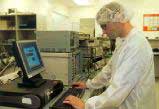MEDICAL DEVICES
New England Corridor
Boasts Strong Base
Boasts Strong Base
Efforts are afoot to portray the I-91 corridor that bisects Connecticut and Massachusetts as prime territory for medical device investment. A report prepared for Hartford, Conn.-based Biomedical Engineering Alliance &

|
| Guidant plans to expand its operations
in Clonmel, Ireland over the next several years and may eventually
add up to 1,000 jobs. |
Dr. Joseph Bronzino, BEACON president and professor of applied science at Hartford's Trinity College, says one of the important findings of the study is the presence of a large precision manufacturing industry in the region, with many of those companies broadening their scope from serving aerospace and defense industries.
"We found that many are already diversifying their markets and are already doing contract work for the medical device industry in other areas of the country," Bronzino says.
The I-91 Corridor has more than 100 medical device manufacturers already. Adding in the precision metalworks and plastics manufacturers swells that total to more than 300, Bronzino says.
What's missing is the presence of investment capital to propel startups, Bronzino says. In meetings subsequent to the June 2004 release of the study, BEACON has added recommendations including development of an industry director for the region. The organization also plans to examine what leading states like California are doing to entice and keep startups.
Other sections of New England are also showing potential. Tiny New Hampshire received the fourth largest amount of venture capital funding during the first two quarters of 2004, according to Mark Leahey, executive director of the Medical Device Manufacturers Association. He says the state is seeing some spillover from Massachusetts, especially in the Nashua and Manchester areas.


